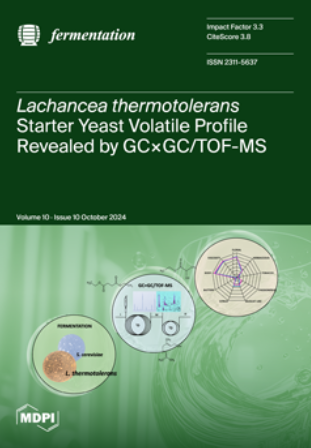感官分析与气相色谱/质谱分析在精酿啤酒评价中的应用
IF 3.3
3区 农林科学
Q2 BIOTECHNOLOGY & APPLIED MICROBIOLOGY
引用次数: 0
摘要
如今的啤酒市场呈现出极其多样化的风格,为消费者尝试新的香气和口味提供了许多可能性。大多数现代啤酒厂都有类似的技术和设备,使用优质的原材料,但啤酒的物理化学性质之间的差异总是可以检测到的。在确保向消费者提供相同质量的啤酒时,感官分析在某些情况下甚至比化学或物理化学分析更重要,因为消费者关注所选啤酒的恒定质量和感官特性。感官评估不是一项容易的任务,需要灵活的方法来确定啤酒之间的差异和变化。它通常用于啤酒厂,以提供稳定的成品质量,同时确保不同原料(水、麦芽、啤酒花)的质量,并最大限度地减少生产过程对啤酒最终质量的影响。这项研究的结果表明,感官分析非常重要,因为纯粹的物理-化学分析可能比它更重要。某些啤酒表明,尽管有高浓度的异味(如二甲基硫),但总体感官评分没有受到影响(10/Koelsch风格),而对于一些啤酒,感官阈值的少量过量会导致极度的感官退化(样品4/Lager)。本文章由计算机程序翻译,如有差异,请以英文原文为准。
Sensory Analysis Coupled with Gas Chromatography/Mass spectrometry Analysis in Craft Beer Evaluation
The beer market today shows extremely diverse styles and offers many possibilities for consumers to try new aromas and tastes. Most modern breweries have a similar technology and equipment and use quality raw materials, but the differences between beers’ physical–chemical properties are always detectable. In ensuring the same beer quality is being delivered to the consumers, sensory analysis is in some cases even more important than the chemical or physical–chemical analysis, since consumers focus on constant quality and sensory properties of their chosen beer. Sensory evaluation is not an easy task and involves flexible methods for determination of differences and changes between beers. It is commonly used in breweries to provide a constant quality in finished products, but also to ensure the quality of different raw materials (water, malt, hops) and to minimize the influence of the production process on final quality of beer. The results of this research indicate that sensory analysis is of great importance, since sheer physical–chemical analysis can be outweighed by it. Certain beers that showed that, despite a high concentration of off-flavors (e.g., dimethylsulphide), the overall sensory score was not affected (10/Koelsch style) while for some beers, a small excess of a sensory threshold lead to extreme sensory deterioration (sample 4/Lager).
求助全文
通过发布文献求助,成功后即可免费获取论文全文。
去求助
来源期刊

Fermentation-Basel
BIOTECHNOLOGY & APPLIED MICROBIOLOGY-
CiteScore
3.80
自引率
18.90%
发文量
594
审稿时长
7 weeks
期刊介绍:
Fermentation-Basel is an international open access journal published by MDPI, focusing on fermentation-related research, including new and emerging products, processes and technologies, such as biopharmaceuticals and biotech drugs. The journal enjoys a good reputation in the academic community and provides a high-impact forum for researchers in the field of bioengineering and applied microbiology.
 求助内容:
求助内容: 应助结果提醒方式:
应助结果提醒方式:


